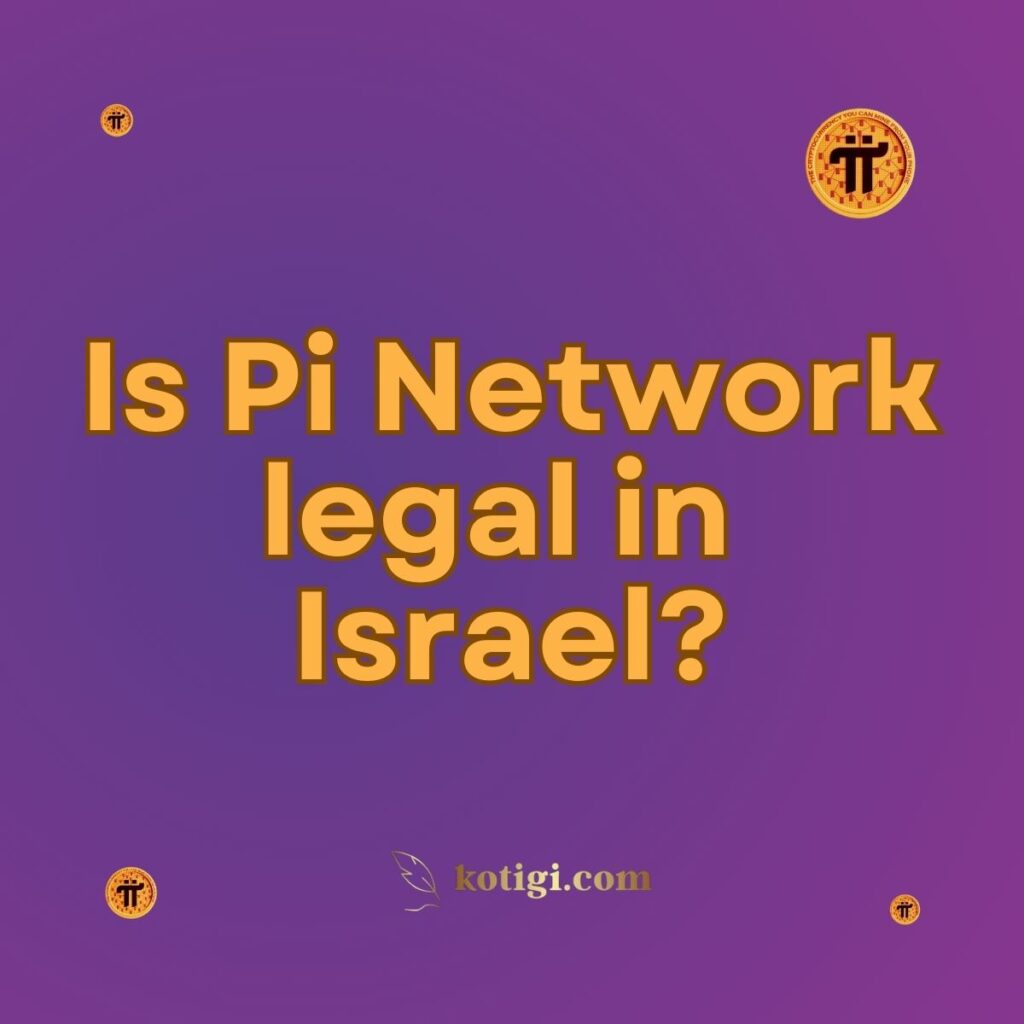
Is Pi Network legal in Israel?
Pi Network’s legal status in Israel, like in many other countries, depends on the evolving regulatory landscape for cryptocurrencies. While there are no specific laws banning Pi Network in Israel, its legal framework follows the broader cryptocurrency regulations in the country.
Introduction
Cryptocurrency regulations vary widely across the globe, and Israel is no exception. As a hub for technological innovation, Israel has seen increasing interest in blockchain technology and digital currencies. However, questions about the legality of specific cryptocurrencies, like Pi Network, often arise. In this article, we’ll explore the current legal landscape of cryptocurrencies in Israel and examine whether Pi Network is considered legal under Israeli law.
1. Cryptocurrency Regulations in Israel
1.1 Legal Status of Cryptocurrencies
In Israel, cryptocurrencies are not considered illegal, but they are not classified as official currencies either. Instead, they are treated as assets for tax purposes. The Israel Tax Authority (ITA) has outlined that gains from cryptocurrency transactions are subject to capital gains tax, which applies to individuals and businesses alike. This means that while owning, trading, and using cryptocurrencies like Bitcoin or Pi is not prohibited, they are heavily regulated to ensure compliance with the country’s tax laws.
1.2 Financial Regulations and Pi Network
Although Pi Network is still in its early stages and not yet listed for open trading, it operates within the broader cryptocurrency space. Any income derived from future Pi transactions or trading could fall under the purview of Israel’s tax laws on cryptocurrencies. Therefore, users who mine or trade Pi coins should stay informed about potential tax liabilities once Pi becomes tradable or when they realize profits from it.
1.3 Central Bank Stance on Digital Currencies
The Bank of Israel, Israel’s central bank, has been cautious about endorsing cryptocurrencies. In several statements, it has warned the public about the risks associated with digital currencies, particularly concerning their volatility and lack of consumer protection. However, no outright ban on the use or mining of cryptocurrencies has been imposed. As a result, platforms like Pi Network, which rely on user participation in mining via mobile apps, are not specifically restricted under the current regulatory framework.
2. Pi Network’s Compliance with Israeli Law
2.1 Mining and Cryptocurrency Exchange Laws
Pi Network’s unique model, where users mine Pi coins on their smartphones without traditional mining equipment, adds a layer of complexity to regulatory considerations. Currently, there are no laws in Israel explicitly addressing mobile-based cryptocurrency mining. However, the activity may still be subject to general financial regulations, especially once Pi coins are assigned a monetary value on exchanges.
Moreover, any future trading of Pi tokens on Israeli exchanges or foreign platforms will likely be subject to Israel Securities Authority (ISA) scrutiny. The ISA has previously expressed concerns about the risks posed by Initial Coin Offerings (ICOs) and cryptocurrency trading. Therefore, Pi Network will need to ensure compliance with any securities regulations that may arise when the token becomes exchangeable.
2.2 Taxation on Earnings from Pi Network
As Pi Network users accumulate tokens that may hold value in the future, they should be aware that any profits derived from the sale or exchange of Pi coins could be subject to Israeli tax laws. Israel’s Tax Authority considers cryptocurrency gains as taxable events. This means users will likely need to declare any earnings from Pi once it becomes tradable, paying either capital gains tax or business income tax, depending on the nature of the transaction.
3. Consumer Protection and Risks
3.1 Lack of Regulation and Consumer Protection
Like many other countries, Israel has not implemented comprehensive consumer protection laws for cryptocurrency users. This means that individuals participating in platforms like Pi Network do so at their own risk. If Pi Network were to face legal challenges or regulatory scrutiny, there is limited recourse for users in Israel to recover lost assets or hold the platform accountable. Users should be aware of these risks before engaging heavily with the platform.
3.2 Potential for Scams or Fraud
While Pi Network is not considered a scam by many, it is important for users to be cautious. The cryptocurrency space is notorious for fraudulent schemes, and regulators in Israel have previously issued warnings to the public about cryptocurrency-related scams. To protect themselves, Israeli users of Pi Network should verify the platform’s legitimacy and stay informed about any regulatory changes that could affect its operations.
4. The Future of Pi Network and Cryptocurrency Regulation in Israel
4.1 Potential Regulatory Changes
The Israeli government has been increasingly focused on regulating cryptocurrencies as their use grows. Future legislative changes may bring clearer guidelines regarding the legality of platforms like Pi Network. As authorities look to balance innovation with consumer protection, stricter rules regarding cryptocurrency mining, trading, and taxation could be implemented. Pi Network users in Israel should stay informed of these developments to ensure they remain compliant with any new laws.
4.2 Pi Network’s Legal Status as It Evolves
As Pi Network progresses and potentially becomes more widely used or exchangeable, its legal status in Israel may be subject to change. For now, the platform operates in a legal gray area—neither explicitly allowed nor banned. Users should take a cautious approach, ensuring they understand the potential regulatory implications and legal risks of using the platform.
Conclusion
Pi Network’s legal status in Israel is closely tied to the country’s broader regulatory approach to cryptocurrencies. While there are no specific laws banning Pi Network, Israeli users must be aware of the legal responsibilities that come with engaging in the platform, particularly regarding tax obligations and potential consumer protection issues. As cryptocurrency regulations evolve, Pi Network’s status in Israel may be subject to further scrutiny and regulation, making it important for users to stay informed of any changes.
Key Takeaways
- Cryptocurrency is legal but regulated in Israel, with tax implications for gains made from transactions.
- Pi Network users may face taxation once the Pi token becomes tradable and holds value in the market.
- No outright ban on mining or using Pi Network exists in Israel, but it falls under general financial regulations.
- Consumer protection in the cryptocurrency space is limited, and users should be cautious of the potential risks.
- Regulations are likely to evolve, so users should monitor any legal developments concerning Pi Network and other cryptocurrencies in Israel.





